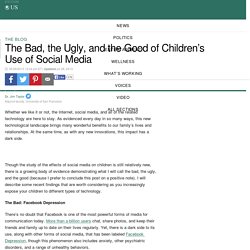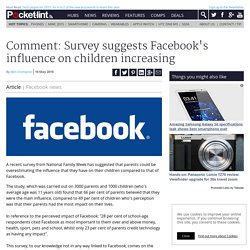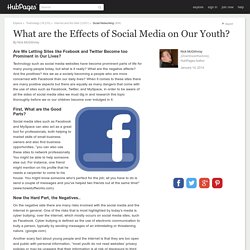

On Chat vs In Person. The Bad, the Ugly, and the Good of Children's Use of Social Media Whether we like it or not, the Internet, social media, and all of the related technology are here to stay.

As evidenced every day in so many ways, this new technological landscape brings many wonderful benefits to our family’s lives and relationships. At the same time, as with any new innovations, this impact has a dark side. Though the study of the effects of social media on children is still relatively new, there is a growing body of evidence demonstrating what I will call the bad, the ugly, and the good (because I prefer to conclude this post on a positive note). I will describe some recent findings that are worth considering as you increasingly expose your children to different types of technology. The Bad: Facebook Depression There’s no doubt that Facebook is one of the most powerful forms of media for communication today. Perhaps the most comprehensive study to date found that Facebook overuse among teens was significantly correlated with narcissism. The Ugly: Internet Addiction. Comment: Survey suggests Facebook's influence on children increasing. A recent survey from National Family Week has suggested that parents could be overestimating the influence that they have on their children compared to that of Facebook.

The study, which was carried out on 3000 parents and 1000 children (who's average age was 11 years old) found that 66 per cent of parents believed that they were the main influence, compared to 49 per cent of children who's perception was that their parents had the most impact on their lives. In reference to the perceived impact of Facebook: "28 per cent of school-age respondents cited Facebook as most important to them over and above money, health, sport, pets and school, whilst only 23 per cent of parents credit technology as having any impact".
This survey, to our knowledge not in any way linked to Facebook, comes on the back of growing criticism of the social networking site over privacy concerns - which is of particular importance where children are concerned. What are we then to make of these statistics? How social media is affecting teens. How Teens Are Really Using Social Media. What are the Effects of Social Media on Our Youth? First, What are the Good Parts?

Social media sites such as Facebook and MySpace can also act as a great tool for professionals, both helping to market skills of small business owners and also find business opportunities, “you can also use these sites to network professionally. You might be able to help someone else out. For instance, one friend might mention on his profile that he needs a carpenter to come to his house. You might know someone who's perfect for the job; all you have to do is send a couple of messages and you've helped two friends out at the same time!”
(www.howstuffworks.com) Now the Hard Part, the Negatives.. On the negative side there are many risks involved with the social media and the internet in general. New studies have shown that site such as Facebook can actually influence you to spend more money. Social Media and Self Influences on the Formation of Identity an. Meet the children blogging about their world. Jake McGowan-Lowe, Jake’s Bones Photograph by Nick McGowan-Lowe Jake McGowan-Lowe, 11, has more than 100 skulls in his bedroom.

‘I don’t find them scary, but my mum does,’ he says, laughing. He gets up ‘at silly hours in the morning’ at weekends to go on walks with his father, Nick, near their home in Braco, Perth, and hunt for bones, all because he needs weekly fodder for his blog, Jake’s Bones. He started the blog four years ago, aged seven. Jake has even been sent bones by well-wishers. Jake, who has two brothers, aged two and one, now has a book in the pipeline, to be published by TickTock (an imprint of Octopus) next spring.
Maelo Manning, Libdem Child On the night of the last general election, in May 2010, Maelo Manning’s house in south London was a local campaign base for the Liberal Democrats – her mother, Jane, a civil servant, is an active party supporter.